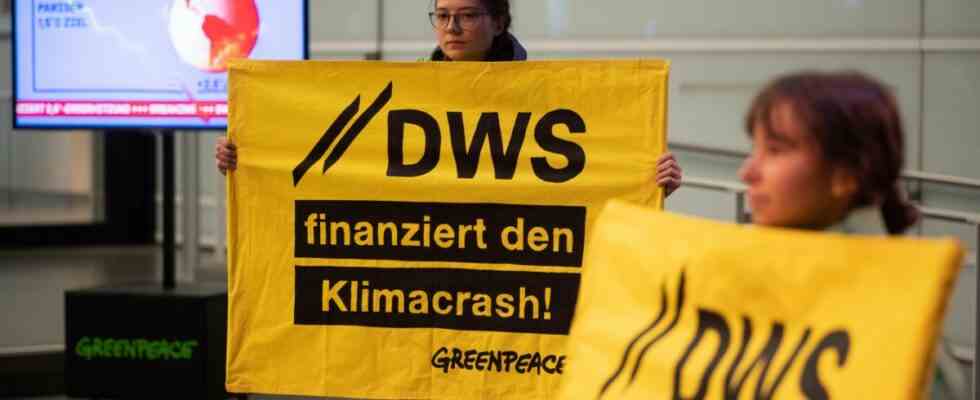For a long time it looked as if fund companies could only win when it came to sustainability. With colorful prospectuses, they lured investors into expensive funds who believed that they were doing something good with it. In the meantime, this has become a business risk, and the fear of the greenwashing pillory or even lawsuits is spreading: fund providers such as Deka, the Deutsche Bank subsidiary DWS or Amundi, are quietly and secretly upgrading their securities funds – from “dark green”. “light green”. The respective investors are suddenly invested in less sustainable funds. According to the Rating agency Morningstar 41 funds were downgraded in this way in the third quarter alone. Green products in particular fall under “Article 9” of the EU regulation for sustainable investments, which may only invest in sustainable investments. The less ambitious funds under Article Eight.
The largest German fund company DWS, where millions of people have their assets managed, has already had its own experience with greenwashing. For more than a year, the question has been raised as to whether DWS has cheated on green investment products. A number of authorities, from the US stock exchange supervisory authority SEC to the Frankfurt public prosecutor’s office, are simultaneously examining allegations by the former sustainability boss Desirée Fixler: In the summer of 2021, she accused her ex-employer of having made false statements in the annual report about what the group was doing denies. When the official audits became known a few weeks later, DWS, which is also listed on the stock exchange, lost a billion euros in market value in one fell swoop. And after a raid by the public prosecutor’s office last May, former CEO Asoka Wöhrmann also had to go. The consumer advice center in Baden-Württemberg recently submitted one antitrust lawsuit against the DWS. The accusation: “misleading advertising for allegedly sustainable investments”.
“Exuberant Marketing”
Stefan Hoops, who was catapulted to the DWS executive chair almost overnight in June – as the preliminary highlight of a long career at Deutsche Bank, must now restore credibility. When it comes to sustainability, he is now speaking softer tones than his predecessor Wöhrmann, who was not very reserved when it came to marketing. “We remain committed to offering sustainable products, but it’s not about being world class or the best provider,” he said at an “investor day” on Thursday, where he first explained his strategy and at the same time promised higher profit targets for 2025.
An internal investigation into the allegations is almost complete. We continue to stand by the financial reports and prospectuses. In the annual report for 2021, DWS subsequently corrected exactly those passages that the former sustainability chief Fixler had criticized. That’s for regulatory reasons alone, said Hoops. In the future, he wants to better control the marketing of eco-financial products through an internal supervisory body and direct reporting channels from employees to the CEO. And yes, there has been “exuberant marketing” for a while, he admits. That is no longer up to date.
Also according to Fixler’s observation, many fund companies have become more cautious, which they attribute to the DWS scandal. The American, just at an event organized by the organization Financial turnaround in detail added to her case, welcoming the reclassification of many funds in Europe as “really good progress”. Also have the British advertising regulator just the big bank HSBC punished for a misleading campaign on the occasion of the world climate conference. In the United States, the supervisors are now also taking a closer look.
On the other hand, many fund companies find it difficult to completely withdraw from financing fossil fuels. Like Deka and Union Investment, DWS continues to invest in oil, gas and coal on a large scale, which has already drawn criticism from Greenpeace and other organizations. Unlike other providers, the fund company still has no guidelines on how to deal with coal companies, Greenpeace complains. In a year of rising energy prices, this helped many funds to post good returns. But is it climate friendly? There is little point in excluding companies, says Hoops, because this is the only way a large shareholder can put pressure on companies to improve. So far, however, DWS has been silent on how this works in detail and again cites regulatory reasons.
But how enthusiastic is Hoops really about the many funds of his own house, which Deutsche Bank also diligently advertises to private investors? According to reports, he had not invested any money in his own products recently. He declined to comment on Thursday. That could be misunderstood as an investment recommendation. But the funds are “fantastic” in any case.

